- Home
- Elizabeth George
The Edge of the Light Page 2
The Edge of the Light Read online
Page 2
As they took off, Rejoice declared, “Next time I’ll make sandwiches to bring with us. What kind of sandwich d’you like best, Derric? PBJ? Roast beef? Ham?”
“Anything but bologna,” he replied, and with a glance over his shoulder at Becca, “What about you, babe?”
“I wasn’t asking Becca,” Rejoice said.
“No prob,” Derric told her. “I was.”
Rejoice settled her shoulders in girl fuming mode. She shot a look at Derric before saying, “Okay. What about you, Becca? Do you even eat sandwiches? I bet you think they’ll make you fat. I bet you exist on celery.”
Becca smiled to herself at this. When she’d first come to the island almost sixteen months previously, fat certainly would have been one of the words to describe her, although chunky had been her mom’s word of choice as she’d monitored every morsel that had passed Becca’s lips. But thinking about her mom was too scary a thing, so instead Becca said, “I go for tuna mostly. But it’s got to have a ton of mayo and relish. And I like whole wheat bread.”
“Course you do,” Rejoice muttered. “It’s more healthy.”
A little silence settled among them. Derric’s gaze met Becca’s in the rear view mirror. She gave him a look that was meant to tell him that there were things he couldn’t put off much longer, but she kept in her head Empty of all there is because she didn’t want to hear what he was thinking. On the other hand, she wouldn’t have minded hearing what was going on in Rejoice’s head, but to loosen her hold on the mantra would mean to give Derric’s thoughts admittance as well as Rejoice’s, and she’d long ago realized that the only way she could even the playing field between herself and her boyfriend was to give him the privacy of his own thoughts. She pretty much always learned them eventually anyway.
Such was the case now. Derric said to Rejoice, “Can I ask you a question?”
“Depends,” Rejoice told him. “Mom’s not letting me date till I’m sixteen, you know. I mean a real date, like at night going to the movies or something.”
“I know that.”
“Oh.” She sounded disappointed. “Then what d’you want to ask me?”
“Why you do white girl hair.”
Becca winced. Very bad idea for a topic of conversation. Girls and their hair . . . ? Guys should just stay away from it. In the case of Rejoice’s hair, Derric would have been wiser to run in the opposite direction. And calling it white girl hair? Dumb, dumb, dumb.
So she was unsurprised when Rejoice demanded, “What’s wrong with my hair?”
“Straight and stiff like that? It looks . . . I dunno. Unnatural, I guess.”
Becca wanted to say, “Don’t!” to Derric. She also wanted to say, “Are you an idiot?” But instead she waited for Rejoice’s reply, which was fast enough in coming.
“So what am I s’posed to do exactly? Shave my head like you?”
He shrugged. “No one in Kampala had hair like yours. Don’t you remember?”
“I didn’t even have hair,” she told him. “And all’s I remember is getting my head shaved. What did I have? Lice or something?”
“Everyone had their heads shaved. Or they wore hair super short so they didn’t have to comb it and break it.”
“My hair doesn’t break,” Rejoice said.
“That’s because of all the gunk you smear on it. What is it anyway?”
“Uh, Derric . . . ?” When he glanced at the mirror, Becca shot him a don’t-go-there look.
“I like my hair this way,” Rejoice said. “I had frizz bombs all over my head and then my mom found this and I like it.”
Becca could feel the girl’s hurt, and she touched Rejoice’s shoulder. “Rejoice, he’s a guy. He doesn’t get it.”
Rejoice flinched to shake Becca off. Derric said, “Whatever,” in that universal male way of ending a discussion.
But Rejoice continued with, “What would make my hair better, then?”
For you went unspoken, but it was as if Rejoice had said it anyway. Derric had to have known that, Becca thought, but instead of reassuring Rejoice that, really, her hair was just fine and he’d been having a moment of male insanity, Derric said, “Wear it short or shave it all off. It’d make you look cool. It’d make you look African.”
What Becca thought was, It’d make you look like Derric, and she couldn’t believe he didn’t know that. On the other hand, maybe that was how he was going to clue Rejoice in to the truth. Head shaved and smiling, Rejoice would virtually be Derric’s twin.
“I’m not African,” Rejoice was saying. “I’m American.”
“Your style might be American,” he replied. “But your blood is African, just like mine.”
Rejoice squirmed in her seat, as if she wanted to disappear into the Forester’s fabric. She set her face and crossed her arms. It wasn’t until they’d finally reached her family’s farm outside of the town of La Conner that she spoke again. Then it was only to say, “You’re really mean, Derric. And not just about my hair.” Before he could reply to this, she jumped out of the Forester and ran to the house.
Becca moved from the back seat to the front. She looked at Derric. He looked at her. He said, “I blew it.”
“Ya think? When did you get so dumb?”
“I was trying to help her out. Her hair—”
“That was seriously uncool.” Becca fastened her seat belt as he backed the car away from the pristine white farmhouse where Rejoice lived with her parents—Jeff and Darla Vickland—and her four siblings. “No girl wants some guy criticizing her hair. Or her body. Or her clothes.”
“I was only trying to help,” he protested. “Her hair looks bad. It’s like . . . grisly. She needs to know it. What else am I supposed to do? I’m her brother, for God’s sake.”
“And you’ve got to tell her that. She’s into you, Derric.”
“No way. She knows I’m just a friend.”
“Don’t be a sponge brain.”
. . . probably feeling jealous of what we have only what we have isn’t anything because I’m not going there no way . . .
Becca was defeated by this sudden jumble of Derric’s thoughts. Even the mantra didn’t help her. She grabbed her backpack from the back seat and began to riffle through it to find what she needed. This was an earbud connected to what looked like—but was not—an iPod. Instead, it was what she’d learned to call an AUD box, a device that obscured the thoughts of others with static so that Becca herself could concentrate.
She said, “Here’s the deal: You can’t control her feelings. She’s into you, and you better tell her who you are. Plus if she shaves her head, she’s going to look like a female you, and how the heck do you explain that one?”
“What you really mean is how the hell do I plan to explain that I’m the brother who left her behind in Kampala because I never bothered to tell anyone that she was my sister?”
“I’m not saying that. I don’t know how you’re going to tell her, but you’re going to have to. And you better do it soon because if you wait much longer, it’s going to go down super bad. Like I said, she’s into you. And before you say I’m jealous or something, what I say is just open your eyes.”
They were at the end of the farm’s long driveway. Derric stopped the car, his gaze on the road. He looked out at the fields across the street and then at Becca.
“What?” she asked him.
“I know,” he replied. “It’s why I wanted you to come this time. I figured if she saw you and me together, she’d see how things are between us.”
“Not if she doesn’t want to,” Becca said.
• • •
DARKNESS CAME EARLY to the Pacific Northwest in the winter, so when Derric and Becca drove through the rainfall into the village of Langley at the south end of the island, lights were blinking in the cottages and houses that spread out before them. They drove down
Third Street, a bumpy lane that descended into the heart of the village and ended at a small, white steepled Methodist church.
Becca had begun her time on Whidbey Island in this old village, which had been born late in the nineteenth century. Then it was a spot from which downed fir trees were shipped to support the growing metropolis of Seattle some thirty miles to the south of where Whidbey lay among the other islands of Puget Sound. Now, however, it was a struggling little place of ancient storefronts and early-twentieth-century cottages. It was set in a landscape filled with visual artists, writers, weavers, glass blowers, sculptors, and retirees. In the summer it boomed with tourists who came by car or by boats that were docked in the town’s natural marina: a watery horseshoe at the base of a tall bluff. In the winter, it was nearly a ghost town, and the business people fought like starving dogs to survive.
One of these business people owned a motel on the far edge of the village, and it was to this motel that Derric drove. Here lived Derric’s official Little Brother. He was called Josh Grieder, and along with his sister Chloe, he was cared for by their grandmother. Here also Becca had stayed during the first few months of her time on Whidbey Island.
When they reached the motel, Derric didn’t pull into the parking lot. Instead, he slowed, pulled to the side of the road, and said to Becca, “You sure you don’t want to come with us? It’s just what you like: comic book action heroes fighting bad guys, lots of explosions, huge car crashes, and a token female in a skimpy costume. And . . . oh yeah, she’ll have big boobs. They always have big boobs.”
Becca pretended to consider this. He was describing the film that was playing in the village movie theater. Going to see this constituted his date with his Little Brother. Josh, she knew, would generously welcome her to join them because that was who the boy was. But his private time with Derric was a treasure to him. She said, “Damn . . . you make it sound so tempting.”
“It was the big boobs that got you,” he said. “Admit it.”
“Oh for sure. I’m excessively into looking at big boobs on a thirty-foot screen.”
“Pizza afterward,” he added.
She gave a sigh meant to convey her intense disappointment at having to decline. “Got to say no. Mrs. Kinsale’s expecting me.”
“You’ll regret it.”
“I’ll try to survive. It’ll be tough, but I’m made of steel.”
He laughed and drove on past the motel. He would, she knew, take her to her destination. He did question it, though, saying, “You’ve been going over there a lot, babe.”
“To Diana’s? Yeah. She’s my friend.”
“She’s sort of old to be a friend, don’t you think? What is she, like . . . seventy or something?”
Becca lifted one shoulder in a halfway shrug. “What difference does that make?”
They coursed to the edge of the village, on a road that took them past an old brick middle school and the tiny fairgrounds beyond it. Before heading out of town entirely, Derric made a turn onto a narrow road that dipped into and out of more forest and passed houses half-hidden among the trees. This ultimately deposited them on a Z-turn that became the lane where Diana Kinsale’s large gray house overlooked a tumble of beach cottages down on the water as well as the fast moving currents of Saratoga Passage.
When he pulled into the driveway and stopped the Forester, Derric turned to Becca. He said, “What d’you guys do?”
“Me and Mrs. Kinsale? Nothing much. Talk mostly. Or we play with her dogs.”
He frowned. “It’s sort of strange, you ask me.”
“I like her, Der. I can learn from her.” She saw his expression shift, and she knew at once what worried him. She added, “I’ve never told her. Or anyone else.”
“What?”
“You know. You. Rejoice. And,” she added hastily, because she knew very well that he didn’t want to go there a second time in one day, “if I bring it up with you, it’s only because I think you’re going to be bummed out until you make everything right.”
“By doing what?”
“By telling the truth.”
He looked at Diana’s house for a long moment and then back at her. She could sense tension in him, but the AUD box prevented her from hearing his thoughts. He said with his dark eyes grown even darker, “That works for everyone, don’t you think, Becca?”
Indeed it did. She held her own secrets close. She left them unspoken to nearly everyone, including to Derric, whom she loved. She knew there should only be truth between them, but she’d told herself since the day she’d met him that it was because she wanted to protect Derric Mathieson that she did not tell him what had brought her to Whidbey.
• • •
BECCA GAVE DERRIC a final wave as he reversed the Forester and then drove back to town. She would, she’d told him, take the island bus to get home. Easy peasy to do that, she’d said. He replied with “Nothing’s easy, Becca,” but he’d kissed her, fondly touched her cheek, and kissed her again.
She went to Diana Kinsale’s front door, removing the AUD box’s earbud from her ear and removing the box itself from her waist. The device would not be necessary.
She saw that lights were on in the house, and when she rang the bell, Diana’s dogs began barking. Through the window, Becca saw four of them charge from the sunroom through the living room and into the entry. They were followed by a stately black poodle who, as ever, did not join in their raucous greeting. From somewhere within, Becca heard Diana’s voice calling out. The barking dogs fell silent. Diana, she realized, had been working with them.
She tried the door. It was unlocked, as usual. She called out, “It’s me,” and was immediately surrounded by the canine pack. They pressed their noses to her pockets. She dug out the treats that she usually carried when she came to Diana’s, and these they devoured with considerable joy. Even the poodle seemed interested. Oscar approached, deigned to be patted on his curly head, and accepted a treat.
Diana’s voice came from the doorway to the kitchen. “Hello, Becca. I had no idea it was time already.”
Becca looked up and immediately felt a quiver of concern. Diana appeared tired, which wasn’t strange. But she also looked ragged. Her posture wasn’t its usual military stance, and the skin beneath her eyes seemed loose. Becca said to her, “You okay, Mrs. Kinsale?”
“I’ve been strolling down memory lane.” She indicated the direction she’d come from. “Basement,” she told Becca. “I’ve finally started on it. Thirty years of living in this house and the basement is crammed. That’s the trouble with basements. Why throw something out when you can just toss it down the stairs and tell yourself you’ll get to it later?”
“What about these guys?” Becca indicated the dogs. Not Oscar, but the rest of the gang. They’d long been far too ungovernable as a group to come into the house. “How come they’re not in their run?”
“They’re in training. Watch.” Diana turned to the dogs. “All dogs come,” she said, and they obeyed her. “All dogs sit,” she said, and again they obeyed. “Of course, I haven’t tried it when there’s a rabbit on the lawn,” she admitted. “All dogs sunroom,” she said to the animals. Off they went.
“Impressive,” Becca said.
“They’re coming along.” Diana wiped her hands on the tail of her flannel shirt. It was overlarge and looked like one of her long dead husband’s. If Diana still had it these nearly thirty years since his death, Becca thought, then her basement was indeed bursting with long forgotten goods.
“Want some help down there?” Becca asked. “We could do that instead of the practice.”
“The practice is far more important,” Diana told her. “Come along. Let’s get started.” She led the way up the stairs and along a corridor painted in the warm colors of a sunset. They did their practicing in Diana’s bedroom, where an alcove offered two comfortable armchairs, a fireplace, and a view
that took in tiny Hat Island and, beyond it at a distance across the water, the city of Everett. This was Diana’s retreat, where she read, relaxed, and meditated. Becca was there to learn a variation of the last: something that was not quite meditation but was instead a way to control what otherwise bombarded her every waking moment.
She walked to the large bay window. From the start, it had been her preference to sit with the view spreading out before her: Hat Island, Camano Head, the energetic water, houses, distant city lights, the occasional boat. But Diana had not allowed this, instructing her instead to sit with her chair facing the fireplace. Above this, the only distraction was a large pastel of a stairway climbing the side of a barn-red building. Becca knew this place quite well. It was called the Dog House, a tavern that stood on the bluff within Langley village.
She turned from the window. “Can I try facing the view this time?”
Diana bent to switch on the gas in the fireplace. She said over her shoulder, “I don’t think you’re ready for that yet. Too many distractions, and at this point you need as few as possible.”
“I want to try it,” Becca said.
“Impatient as always.” But Diana softened the criticism with a smile. “Overcoming impatience is at the core of this process, Becca. Your mind still moves toward rushing instead of being. Being is the key to unlocking the power.”
Becca narrowed her eyes. “You’re getting way too close to Yoda again, Mrs. Kinsale.”
Diana laughed. “I hope I’m more attractive. All right, try it if you must.”
Becca pumped her fist and swung her chair to face the window. She plopped down. “Ready when you are,” she told Diana.
“Settle first,” Diana said. “Breathe. Go deep. Feel the blood coursing. Feel the heart beating.” She waited more than a minute before saying quietly, “Now. Find something in the view to concentrate on.”
Becca settled her gaze on Hat Island, on one of the houses that winked light into the late afternoon darkness. She murmured, “Got it,” and Diana said softly, “There is no world. There is only this. The moment itself, the single point on which your eyes are resting. Begin with the mantra, then slowly let it go.”

 Well-Schooled in Murder
Well-Schooled in Murder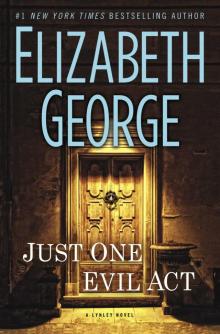 Just One Evil Act
Just One Evil Act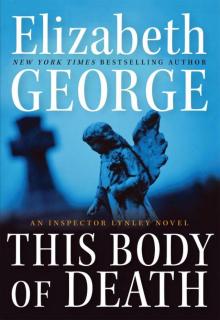 This Body of Death
This Body of Death The Edge of the Water
The Edge of the Water For the Sake of Elena
For the Sake of Elena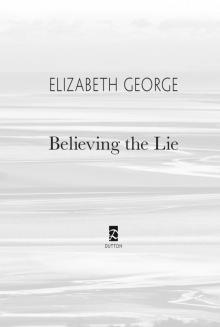 Believing the Lie
Believing the Lie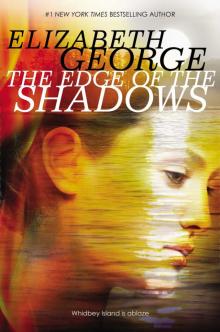 The Edge of the Shadows
The Edge of the Shadows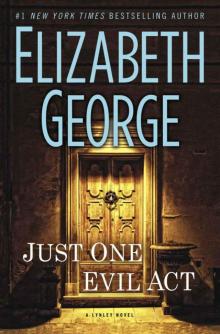 Just One Evil Act: A Lynley Novel
Just One Evil Act: A Lynley Novel In Pursuit of the Proper Sinner
In Pursuit of the Proper Sinner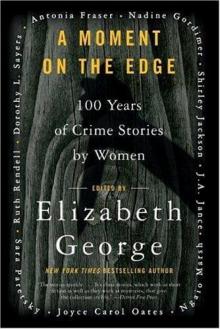 A Moment on the Edge:100 Years of Crime Stories by women
A Moment on the Edge:100 Years of Crime Stories by women Elizabeth I
Elizabeth I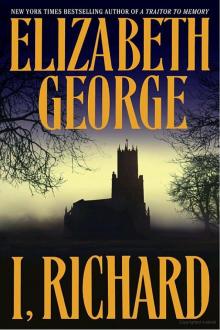 I, Richard
I, Richard A Traitor to Memory
A Traitor to Memory Missing Joseph
Missing Joseph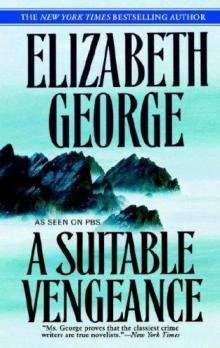 A Suitable Vengeance
A Suitable Vengeance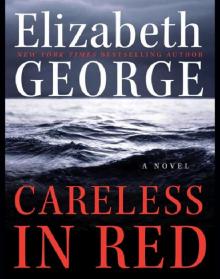 Careless in Red
Careless in Red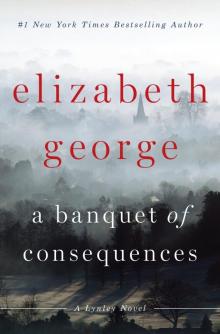 A Banquet of Consequences
A Banquet of Consequences Playing for the Ashes
Playing for the Ashes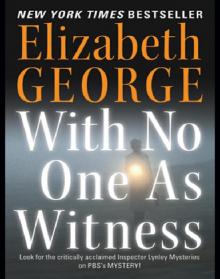 With No One As Witness
With No One As Witness Deception on His Mind
Deception on His Mind The Best American Mystery Stories 2016
The Best American Mystery Stories 2016 A Great Deliverance
A Great Deliverance In the Presence of the Enemy
In the Presence of the Enemy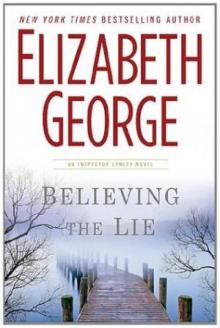 Believing the Lie il-17
Believing the Lie il-17 The Edge of the Light
The Edge of the Light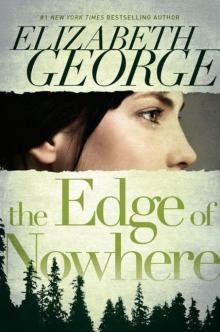 SW01 - The Edge of Nowhere
SW01 - The Edge of Nowhere A Place of Hiding
A Place of Hiding What Came Before He Shot Her il-14
What Came Before He Shot Her il-14 Payment In Blood
Payment In Blood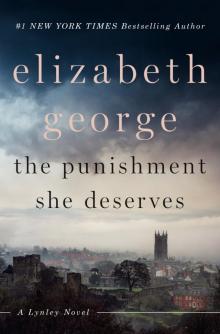 The Punishment She Deserves
The Punishment She Deserves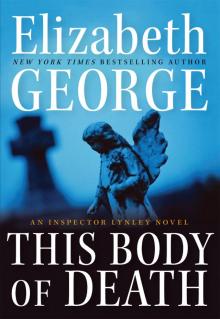 This Body of Death: An Inspector Lynley Novel
This Body of Death: An Inspector Lynley Novel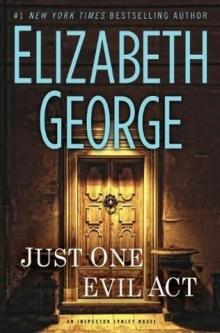 Just One Evil Act il-18
Just One Evil Act il-18 What Came Before He Shot Her
What Came Before He Shot Her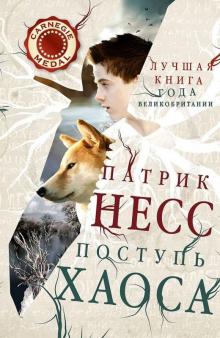 Missing Joseph il-6
Missing Joseph il-6